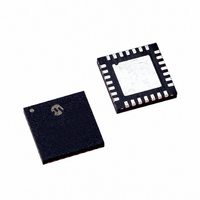PIC18F2423-I/ML Microchip Technology, PIC18F2423-I/ML Datasheet - Page 34

PIC18F2423-I/ML
Manufacturer Part Number
PIC18F2423-I/ML
Description
16KB, Flash, 768bytes-RAM, 25I/O, 8-bit Family,nanoWatt 28 QFN 6x6mm TUBE
Manufacturer
Microchip Technology
Series
PIC® 18Fr
Datasheets
1.PIC18F2423-ISP.pdf
(54 pages)
2.PIC18F2423-ISP.pdf
(8 pages)
3.PIC18F2423-ISP.pdf
(34 pages)
Specifications of PIC18F2423-I/ML
Core Processor
PIC
Core Size
8-Bit
Speed
40MHz
Connectivity
I²C, SPI, UART/USART
Peripherals
Brown-out Detect/Reset, HLVD, POR, PWM, WDT
Number Of I /o
25
Program Memory Size
16KB (8K x 16)
Program Memory Type
FLASH
Eeprom Size
256 x 8
Ram Size
768 x 8
Voltage - Supply (vcc/vdd)
4.2 V ~ 5.5 V
Data Converters
A/D 10x12b
Oscillator Type
Internal
Operating Temperature
-40°C ~ 85°C
Package / Case
28-VQFN Exposed Pad, 28-HVQFN, 28-SQFN, 28-DHVQFN
Lead Free Status / RoHS Status
Lead free / RoHS Compliant
For Use With
XLT28QFN4 - SOCKET TRANS ICE 28QFN W/CABLEAC164322 - MODULE SOCKET MPLAB PM3 28/44QFN
Lead Free Status / RoHS Status
Lead free / RoHS Compliant, Lead free / RoHS Compliant
PIC18F2423/2523/4423/4523
2.8
An A/D conversion can be started by the Special Event
Trigger of the CCP2 module. This requires that the
CCP2M<3:0> bits (CCP2CON<3:0>) be programmed
as ‘1011’ and that the A/D module is enabled (ADON
bit is set). When the trigger occurs, the GO/DONE bit
will be set, starting the A/D acquisition and conversion,
and the Timer1 (or Timer3) counter will be reset to zero.
Timer1 (or Timer3) is reset to automatically repeat the
A/D acquisition period with minimal software overhead
(moving ADRESH:ADRESL to the desired location).
TABLE 2-3:
DS39755C-page 34
INTCON
PIR1
PIE1
IPR1
PIR2
PIE2
IPR2
ADRESH
ADRESL
ADCON0
ADCON1
ADCON2
PORTA
TRISA
PORTB
TRISB
LATB
PORTE
TRISE
LATE
Legend: — = unimplemented, read as ‘0’. Shaded cells are not used for A/D conversion.
Note 1:
Name
(1)
2:
3:
4:
(1)
(1)
Use of the CCP2 Trigger
These registers and/or bits are not implemented on PIC18F2423/2523 devices and are read as ‘0’.
PORTA<7:6> and their direction bits are individually configured as port pins based on various primary
oscillator modes. When disabled, these bits read as ‘0’.
RE3 port bit is available only as an input pin when the MCLRE Configuration bit is ‘0’.
For these Reset values, see Section 4.0 “Reset” of the “PIC18F2420/2520/4420/4520 Data Sheet”
(DS39631).
PORTB Data Direction Control Register
PORTB Data Latch Register (Read and Write to Data Latch)
GIE/GIEH PEIE/GIEL TMR0IE
A/D Result Register High Byte
A/D Result Register Low Byte
TRISA7
PSPIE
PSPIP
PSPIF
OSCFIF
OSCFIE
OSCFIP
ADFM
RA7
Bit 7
RB7
IBF
—
—
—
—
REGISTERS ASSOCIATED WITH A/D OPERATION
(2)
(1)
(1)
(1)
(2)
TRISA6
RA6
CMIE
CMIP
CMIF
ADIF
ADIE
ADIP
Bit 6
OBF
RB6
—
—
—
—
—
(2)
(2)
PORTA Data Direction Control Register
VCFG1
ACQT2
CHS3
RCIE
RCIP
IBOV
RCIF
Bit 5
RA5
RB5
—
—
—
—
—
PSPMODE
VCFG0
ACQT1
INT0IE
CHS2
Bit 4
TXIF
TXIE
TXIP
EEIF
EEIE
EEIP
RA4
RB4
—
—
PCFG3
ACQT0
SSPIF
SSPIE
SSPIP
BCLIE
BCLIP
RE3
BCLIF
CHS1
RBIE
Bit 3
RB3
RA3
The appropriate analog input channel must be selected
and the minimum acquisition period is either timed by
the user or an appropriate T
the Special Event Trigger sets the GO/DONE bit (starts
a conversion).
If the A/D module is not enabled (ADON is cleared), the
Special Event Trigger will be ignored by the A/D
module, but will still reset the Timer1 (or Timer3)
counter.
—
—
(3)
PORTE Data Latch Register
TMR0IF
CCP1IE
CCP1IP
CCP1IF
HLVDIF
HLVDIE
HLVDIP
TRISE2
PCFG2
ADCS2
CHS0
Bit 2
RA2
RB2
RE2
GO/DONE
TMR2IF
TMR2IE
TMR2IP
TMR3IF
TMR3IE
TMR3IP
TRISE1
PCFG1
ADCS1
INT0IF
Bit 1
RA1
RB1
RE1
© 2009 Microchip Technology Inc.
ACQ
TMR1IE
TMR1IP
TMR1IF
CCP2IF
CCP2IE
CCP2IP
TRISE0
PCFG0
ADCS0
time is selected before
ADON
RBIF
Bit 0
RA0
RB0
RE0
Values on
(Note 4)
(Note 4)
(Note 4)
(Note 4)
(Note 4)
(Note 4)
(Note 4)
(Note 4)
(Note 4)
(Note 4)
(Note 4)
(Note 4)
(Note 4)
(Note 4)
(Note 4)
(Note 4)
(Note 4)
(Note 4)
(Note 4)
(Note 4)
Reset
page



















